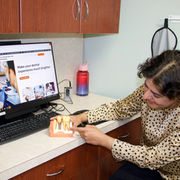How to Recover Quickly from a Root Canal Procedure
- Sep 19, 2023
- 2 min read
Updated: Oct 16, 2023
Root canal or endodontic treatment is a dental procedure performed to repair and save a severely damaged or infected tooth. It involves removing the infected or injured pulp (soft inner tissue) from the tooth's root canals, cleaning and disinfecting the canals, and then filling them with a biocompatible gutta-percha material. Root canal treatment aims to eliminate the infection, alleviate pain, and preserve the tooth rather than extracting it. The need for a root canal may arise when tooth decay, trauma, or a deep cavity allows bacteria to reach the pulp, causing an infection or inflammation. Common symptoms that may indicate the need for a root canal include severe toothache, prolonged sensitivity to hot or cold temperatures, swelling, and tenderness around the tooth or gums.
During the procedure, the dentist or endodontist (a specialist in root canal therapy) will numb the area with a local anesthetic, create an access opening in the tooth, remove the infected pulp, and thoroughly clean the canals. Afterward, the canals are filled with gutta-percha material and sealed. In most cases, a dental crown is placed over the treated tooth to provide strength and protection. Root canal treatment is a highly successful procedure that can relieve pain, save the natural tooth, and restore its function. It is essential to address any symptoms promptly and consult with a dental professional to determine if root canal treatment is necessary.

Recovering from a root canal procedure can vary from person to person, but here are some general tips to help promote a quicker recovery:
Follow post-treatment instructions: Your dentist will provide specific guidelines for aftercare. It's essential to follow them carefully, including any prescribed medications and recommended oral hygiene practices.
Take pain relievers as directed: If you experience discomfort after the procedure, your dentist may recommend over-the-counter pain relievers. Follow their instructions and take the medication as directed.
Apply ice packs: To reduce swelling and alleviate pain or discomfort, gently apply ice packs to the affected area for short periods. Use a thin cloth or towel to protect your skin from direct contact with the ice.
Stick to soft foods: In the first few days following the root canal, it's advisable to stick to soft foods that require minimal chewing. This allows your tooth and surrounding tissues to heal without unnecessary strain.
Avoid extreme temperatures and pressure: During the initial recovery period, avoid exposing the treated tooth to hot or cold temperatures. Also, be mindful of not putting excessive pressure on the tooth while chewing.
Practice good oral hygiene: Follow your dentist's instructions regarding brushing and flossing, ensuring proper oral hygiene. Gentle and careful brushing around the treated area is essential.
Attend follow-up appointments: Keep your scheduled follow-up appointments with your dentist. They will assess your progress and ensure the tooth is healing properly.
Remember, these are general suggestions, and it's crucial to consult your dentist for personalized advice based on your situation. For more information about dental health, please call one of our offices or contact us online. Our goal is to keep our patients always smiling with confidence!














Comments